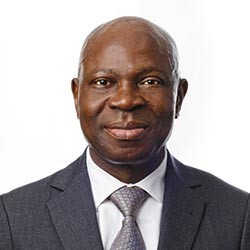Gilbert F. Houngbo, IFAD President, at the Malabo Montpelier Panel
IFAD Asset Request Portlet
Asset Publisher
Gilbert F. Houngbo, IFAD President, at the Malabo Montpelier Panel
What do the outcomes of the FSS mean for African Food Systems Transformation?
Location: Montpelier
30 October 2021I wish I could be with you in person for this important conversation on transforming African agriculture.
There is huge potential for small farms to meet Africa’s food needs, while also generating new rural enterprises linked to food processing and distribution.
Let’s recall that our food is grown in rural areas, where 60 per cent of Africa’s population lives. The agricultural sector employs around half of Africa’s working population.
But poverty is also concentrated in rural areas – around 80 per cent of the extremely poor are rural, not urban. Most depend on small farms for food and income.
Food systems should, and can, be an engine of economic growth for the continent given that Agriculture contributes 27 per cent of Africa’s GDP (excluding South Africa). Yet productivity lags compared to other parts of the world.
Reflecting back on the outcomes of the FSS, I am of the view that together we shall work with African leaders in transforming the agriculture sector particularly in the following:
-
- The productivity challenge
- Basic (food) transformation
- Rural adaptation and mitigation and building resilience
- Innovation
- Ensuring minimum living income for the rural household
- Access to markets
Technology and innovation on the one hand, as well as funding on the other hand shall be the greatest enablers.
I just don’t see how we could make it happen in Africa without an intentional serious zooming on bringing innovation and new affordable technologies to rural communities. Not only is it essential for solving the productivity challenge, but also to ease the hardship and make the agriculture and food sector more attractive to the youth.
Access to technology would also be required for the continent to ramp up food transformation and value addition so to reduce the import bill and increase food exports while reducing food loss.
On the funding. ODA alone will not be enough to transform Africa’s food systems and deliver on our SDG commitments to end poverty and hunger.
Consider that for sub-Saharan Africa alone, an additional US$8 billion a year is needed from donor governments to end hunger, double the incomes of small-scale farmers, and limit agricultural emissions in line with the Paris climate agreement.
Additionally, across the continent there is a $120 billion financing gap for small and medium sized agricultural enterprises.
In bridging this gap, Public Development Banks offer huge potential. Forty-one PDBs have an agricultural development mandate. Of these, nearly one-quarter are in Africa. They already supply significant formal financing for agriculture. And they have the potential to do much more.
The new coalition of PDBs that emerged from the Food Systems Summit will provide a foundation for that to happen, helping them to scale-up, while improving their transparency.
IFAD is working with partners to accelerate learning and innovation among PDBs, and to ensure they target green and inclusive finance.
Transforming the agriculture sector in Africa has to be intrinsically linked to building resilience and helping small scale farmers to better adapt to climate change while advancing as well on the mitigation front. Building farmers capacity for resilient farming techniques, access to technology for better weather forecasting, efficient use of fresh water, improved seeds, all these are few examples of the way forward.
Let me not forget, or underestimate, the importance of data collection to feed the policy work and to fine-tune the best practices.
Finally, I would like to make a plea for continuing investment in developing the agribusiness mindset with the African youth.
IFAD is determined to continue working with all partners, and in particular, those important on the ground in assisting countries with implementing their national pathways.
Together we can ensure that our efforts are really inclusive and reach the last mile -- addressing the needs of the most marginalized and those most at risk of being left behind.
